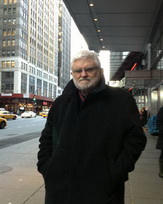
March 12, 2014
Chris McDonnell, UK
A thoughtful few days
(Comments
welcome here)
chris@mcdonnell83.freeserve.co.uk

|
|
March 12, 2014 Chris McDonnell, UK
A thoughtful few days
|
chris@mcdonnell83.freeserve.co.uk
|
I sent a friend a
copy of last week’s posting for Ash Wednesday. In acknowledging receipt of my
e-mail, he concluded with the line,
“Have
a less ascetic Lent but a more thoughtful one.”
That
phrase has been rumbling round my mind since I first read it. Two words, and
their meaning, are key, ‘ascetic’ and ‘thoughtful’.
What
do they mean? What are the implications for our experience in Lent? How should
we react?
There
is a long history, in many religious traditions, of the ascetic way of life, the
voluntary acceptance of personal deprivation for a higher goal. This can be mild
in form, whether it be a matter of diet, fasting or a shorter time spent in
sleep, all practiced as means to an end. Or it might be extreme, involving
physical discomfort and real challenge over the short or longer term.
Is
it the case that underlying all ascetic practice is the notion that the goal of
reaching God comes through our personal suffering? I find some difficulty with
that, even though in its ultimate form, martyrdom, it indicates a greater love
that involves the greater sacrifice.
So
in the time of Lent, the giving up of something, with whatever discomfort or
inconvenience that causes, has been seen as beneficial to the Christian life, a
way of moving forward, a stripping away of unnecessary clutter.
Maybe
that is all well and good, but what about that other word in my friend’s
e-mail, ‘thoughtful’? There is here the implication of reflection, the
necessary pause that gives opportunity to ask questions. This is missing for so
many people, they never have time to pause, to reflect, to be thoughtful. A
priest here in UK, who was ordained before the Council, often argues that for
many priests today, they live such busy, task-orientated lives that they have
little time to be thoughtful, to read and to reflect on the considered writings
of others. So their growth is restricted, there is little to replenish the worn
personal fabric of their overcrowded lives. They gradually lose their vitality,
and enthusiasm diminishes.
There
is a strong argument therefore for Lent to be the ‘pause time’ for
reflection, for thoughtfulness, for personal care and renewal. That time has to
be created, carefully set aside and protected from intrusion.
The
Cistercian, John Eudes Bamberger, said this in conversation with Henri Nouwen.
“Time has to be set aside
for regular prayer,
time made so that life revolves
and evolves round our time
with the Lord.
Set a time that is reasonable,
and once it is set,
stick to it all costs.
Make it your most important task.
Let everyone know
that this is the only thing
you will not change,
and pray at that time”.
Maybe
here is the crux of a Lenten resolution. Take one essential aspect of prayer to
be a thoughtful Christian reflection on our individual circumstance and a wish
to have a greater understanding of God, a willingness to listen, and there it
is. Hard to do, ascetic is one sense, the need to stick to it, but thoughtful in
the time we set aside and how we use it, how it might change us.
Rabbi
Lionel Blue, speaking on BBC Radio 4 back in February 2002, concluded his talk
with these words.
“I have found that prayer doesn’t change the cosmos but it does
change me”.
END